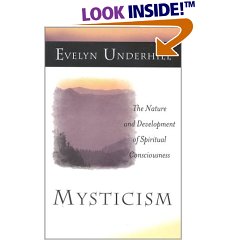(excerpts from pages 100-107 of Why God Won’t Go Away, Brain Science and the Biology of Belief, by Andrew Newberg, M.D. and Eugene D’Aquili, M.D., PhD., 2001; Ballantine Publishing Group. Dr. Newberg refers much to the work of Evelyn Underhill)

In her book Mysticism, a preeminent study of mystical spirituality, author Evelyn Underhill calls the term mysticism “One of the most abused words in the English language.
“It has been used in different and often mutually exclusive senses by religion, poetry and philosophy,” she says, “has been claimed as an excuse for every kind of occultism, for dilute transcendentalism, vapid symbolism, religious or aesthetic sentimentality, and bad metaphysics. On the other hand, it has been freely employed as a term of contempt by those who have criticized these things.”
In modern usage, “mysticism,” like its linguistic cousin “myth,” is often used pejoratively to dismiss sloppy or superstitious thinking. The New World Dictionary, in fact, defines the word as “vague, obscure, or confused thinking or belief.” But for Underhill, there is nothing vague or confused in mystical thought. Mysticism, she says, “is not an opinion: It is not a philosophy. It has nothing in common with the pursuit of occult knowledge. . . . It is the name of that organic process which involves the perfect consummation of the Love of God: the achievement here and now of the immortal heritage of man. Or, if you like it better—for this means exactly the same thing—it is the art of establishing his conscious relation with the Absolute.”
Underhill’s definition is supported by the words of the mystics themselves. According to the fourteenth-century German mystic John Tauler, for example, the mystic’s soul becomes “sunk and lost in the Abyss of the Deity, and loses the consciousness of all creature distinctions. All things are gathered together in one with the divine sweetness, and the man’s being is so penetrated with the divine substance that he loses himself therein, as a drop of water is lost in a cask of strong wine.” [quoted by Underhill]
Mystical experience, in other words, is not about magic, or mind-reading, or the conjuring of visions or spirits; it is nothing more or less than an uplifting sense of genuine spiritual union with something larger than the self. This definition is consistently endorsed by the accounts of mystics throughout time, and in all religious traditions. Those same accounts also suggest that mystical experience is a distinct and cohesively patterned phenomenon.
. . . .
At the heart of all the mystic’s descriptions . . . is the compelling conviction that they have risen above material existence, and have spiritually united with the absolute. The primordial longing for this absolute union, and the transcendent experiences to which it might lead, are the common threads that run through the mystical traditions of East and West, of ancient centuries, and of the present. And while the mystics of different times and traditions have used many techniques to attain this lofty union, . . . the mystical states they describe sound very much the same.
. . . .
. . . the attainment of spiritual union through detachment from the self . . . is rooted in something deeper and more primal than theology or scriptural revelation. . . . those mechanics are wired into the human brain, and are set in motion by nothing more tangible than the mind willing itself toward God.